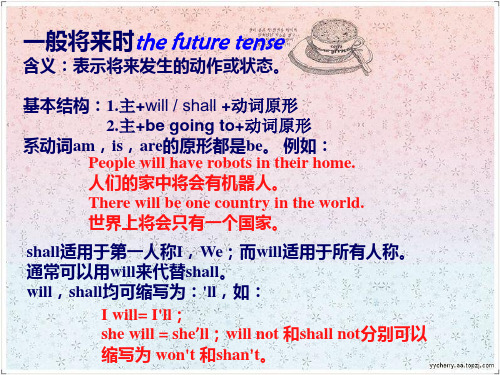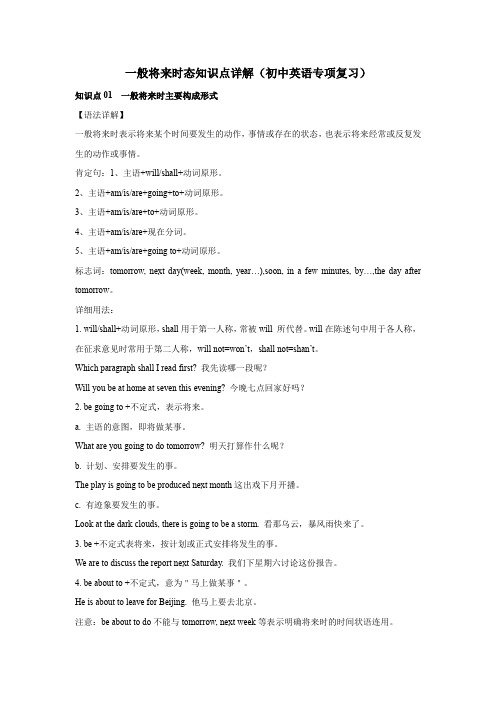一般将来时肯定句,否定句,一般疑问句及其回答的句式
一般将来时

I will not go swimming tomorrow.
一般疑问句
be动词或will提到句首,some改为any, and 改为or,第一二人称互换。 例如: I am going to buy some apples tomorrow. Are you going to buy any apples tomorrow? I will buy some apples tomorrow.
一、填空。 5. Nancy is going to go camping.(改否定) Nancy ________ going to go camping. 6. I’ll go and join them.(改否定) I _______ go ______ join them. 7. I’m going to get up at 6:30 tomorrow.(改一般疑问句) ________ _______ ________ to get up at 6:30 tomorrow? 8. We will meet at the bus stop at 10:30.(改一般疑问句) _______ ________ meet at the bus stop at 10:30? 9. She is going to listen to music after school.(对划线部分 提问) ________ _______ she ________ ________ _________ after school? 10. My father and mother are going to see a play the day after tomorrow.(同上) _________ they going to_____ the day after tomorrow?
一般将来时一般疑问句结构和回答结构

一般将来时一般疑问句结构和回答结构1.一般过去式句子的句式结构:主语+ 动词过去式(be 动词的过去式/ 行为动词的过去式)如:She was a student two years ago.她两年前是学生。
We were on the farm last week.我们上周在农场。
We sang at the party yesterday.我们昨天在派对上唱歌。
否定形式:①was/were+not;②在行为动词前加didn't,同时还原行为动词。
2.一般将来时句式结构:肯定句:I/We shall/will go. You/He/She/They Will go.否定句:I/We shall/will not go. You/He/She/They Will not go.疑问句:Shall I/we go? Will you/he/she/they go?简略回答:肯定回答:Yes,主语shall/will.否定回答:No,主语shall/will not.特殊疑问句:一般将来时的特殊疑问句是将疑问词放在句首,后接一般疑问句(就主语提问时,以疑问词who开头的疑问词除外)例子:Why will you be here on sunday?I will have a meeting on sunday.(1)常见结构:(a)will / shall 动词原形这种方法一般单纯地表示将来某个时间将要发生的动作或存在的状态。
will用于各种人称;shall只用于第一人称。
例如: I will / shall go to visit him next week. 下周我将去拜访他。
What time shall we go there tomorrow? 明天我们几点去那儿?(b)be going to 动词原形be going to 相当于一个助动词(其中be有人称和数的变化),与它后面的动词原形一起构成谓语。
一般将来时态讲解

will
说话人认为、相信、希望或假定要发生 的事,不含任何具体的时间,可以指遥 远的未来。 I believe China will become one of the richest countries in the world.
be going to
有迹象表明某事即将发生或肯定会发生, 通常表示很快就要发生的事情。 There is going to be a quarrel between them, I think.
• • • • • • •
Is there a film tonight? 今晚有电影吗? I write my paper tomorrow. Tomorrow is Christmas Day. When does the ship sail? She retires next month. How long does he stay? The plane takes off at eight and arrives in Beijing at eleven.
1.一般将来时的用法
• ①表示将来某一时间将要发生的动作或 存在的状态, I shall be free this afternoon. • There'll be no chemistry classes tomorrow. • They will probably go to Shanghai for their holiday. • 注意:在口语中,常用will / shall + be doing结构来代替will / shall + 动词原形, 以表示生动。 • I‘ll be seeing a friend off at the airport. • He'll be going with us tomorrow.
2015年初中英语基本时态总结[一般现在 一般过去 一般将来]
![2015年初中英语基本时态总结[一般现在 一般过去 一般将来]](https://img.taocdn.com/s3/m/0302742310a6f524cdbf8526.png)
二
一般将来时
fly kites
tomorrow He will fly kites tomorrow.
play basketball next Wednesday
They will play basketball next Wednesday.
He will fly kites tomorrow.
He is happy.
否定句: 一般疑问句: 肯定回答: 否定回答:
He is not (isn’t) happy. Is he happy? Yes, he is. No, he isn’t.
I am happy.
否定句: 一般疑问句: 肯定回答: 否定回答:
I am not happy. Are you happy? Yes, I am. No, I am not.
主语为第三人称单数 Does+主语+动词原形+其它成分? Does the earth go arou一般时态):
疑问词+is/am/are +主语+(其它成分)? 疑问词+do +主语+动词原形+(其它成分)?
What time is it now? When do you usually go to bed?
肯定式
否定式
疑问式
肯定否定回答
I am a teacher.
I a m n o t a A m I a Yes, I am.
teacher.
teacher? No, I am not.
He/she is a teacher.
He/she is not I s h e / s h e Yes, he/she is. a teacher. a teacher? N o , h e / s h e
一般将来时态知识点详解(初中英语专项复习) (4)

一般将来时态知识点详解(初中英语专项复习)知识点01 一般将来时主要构成形式【语法详解】一般将来时表示将来某个时间要发生的动作,事情或存在的状态,也表示将来经常或反复发生的动作或事情。
肯定句:1、主语+will/shall+动词原形。
2、主语+am/is/are+going+to+动词原形。
3、主语+am/is/are+to+动词原形。
4、主语+am/is/are+现在分词。
5、主语+am/is/are+going to+动词原形。
标志词:tomorrow, next day(week, month, year…),soon, in a few minutes, by…,the day after tomorrow。
详细用法:1. will/shall+动词原形,shall用于第一人称,常被will 所代替。
will在陈述句中用于各人称,在征求意见时常用于第二人称,will not=won’t,shall not=shan’t。
Which paragraph shall I read first? 我先读哪一段呢?Will you be at home at seven this evening? 今晚七点回家好吗?2. be going to +不定式,表示将来。
a. 主语的意图,即将做某事。
What are you going to do tomorrow? 明天打算作什么呢?b. 计划、安排要发生的事。
The play is going to be produced next month这出戏下月开播。
c. 有迹象要发生的事。
Look at the dark clouds, there is going to be a storm. 看那乌云,暴风雨快来了。
3. be +不定式表将来,按计划或正式安排将发生的事。
We are to discuss the report next Saturday. 我们下星期六讨论这份报告。
小升初英语语法句型转换-一般将来时(全国通用版)

am going to go
will go
1.I am tired. I __________
(go) to bed early
tonight.
2.Mary’s birthday is next Monday. Her brother
_____________(give)
her a present.
(2)否定句:
主语+ be + not going to +动词原形+其他.
如:
I am not going to plant trees this weekend. 这个周
末我不打算去种树。
They aren’t going to climb mountains this week.
这周他们不打算去爬山。
下周你们要去做什么?
—We will have a picnic in the park.
我们将去公园野餐。
一般将来时的用法
1. 时间标志词:
1⃣️tomorrow系列
2⃣️next系列
3⃣️in the future
4⃣️in+一段时间 等表示将来的时间状语。
如:
We will go to Shanghai next week.
week.(改否定)
won’t
go
Shirley ____ ____ to visit her grandma next
week.(改否定)
练习
We will hold a meeting this evening.(改一般疑
问句)
you
Will
____ ____ hold a meeting this evening?
一般将来时用法
一般将来时用法一、一般将来时的动词形式一般将来时表示将来某个时间将要发生的动作或存在的状态,也表示将来经常或反复发生的动作。
一般将来时由助动词shall或will加动词原形构成,shall 用于第一人称,will用于第二、三人称。
但是现在第一人称一般也用will,其区别并不明显。
(或“be going to + 动词原形)常与tomorrow, next… , in (the) future,soon, in five days,in two weeks等连用。
如: I shall not come if it rains tomorrow. 如明天下雨我就不来。
My father will leave for China next week. 我的爸爸下星期要到中国去。
“I’ll, You’ll, He’ll , She’ll , It’ll, We’ll , They’ll …”是简缩形式。
二.一般将来时的句型1.肯定句:主语+shall /will+动词+其他成份The workers will build a new school here next year.工人们明年将在这儿盖一所新学校。
They will go shopping this afternoon. 今天下午他们将要去购物。
We shall have a delicious dinner tonight. 今晚我们将美餐一顿。
We shall be there before dark. 我们天黑前会到达那里。
2.否定句:主语+shall /will+not+动词+其他成份She won’t come back this week.这一周她不回来了。
I will not go shopping one hour later. 一小时之后我不会去购物。
He won’t play football with you before he finishes his work.他干完活后才能跟你踢足球。
一般将来时
第七讲:一般将来时一. 一般将来时表示将来某一时刻的动作或状态。
常常和表示将来的时间状语连用。
如:tomorrow(明天),next week(下周);in the future(将来),in+时间段等。
二. 一般将来时的句型结构:肯定句:主语+will/shall+ 动词原形+其它否定句:主语+ will/shall not+ 动词原形+其它一般疑问句:Will/Shall+主语+ 动词原形+其它?回答: Yes,主语+will/shall No,主语+will /shall not【注意】will 用于各种人称,shall用于第一人称。
will not=won’t shall not=shan’t另外is/am/are going to+动词原形也用于一般将来时肯定句:主语+is/am/are going to+动词原形+其它否定句:主语+is/am/are+not going to+动词原形+其它一般疑问句:Is/am/are+主语+going to+动词原形+其它?回答:Yes, 主语+is/am/are No, 主语+is/am/are+not【注意】Be(am/is/are)随着主语的变化而变化。
1)表示有计划,有打算将要做某事。
Li Lei is going to see his aunt next Sunday.2)go,come,leave,start,arrive等表示位置移动的动词用进行时表示将来。
He is leaving for Beijing next week.三.There be结构的一般将来时:肯定句:There will be....或There is /are going to be....否定句:There will not be....或There is/are not going to be.....一般疑问句:Will there be....或Is/Are there going to be.......回答:Yes, there will. 或 Yes, there is/are.No,there won’t. 或No, there is/are not.一般将来时练习题:一.用括号内所给动词的正确形式填空。
一般将来时态
7.明天的天气会是怎样? What _w_i_ll_t_h_e_w__ea_t_h_e_r _b_e_ l_ik_e__ tomorrow?
4. be about to + 动词原形。 表示 (1)“即将做”或“马上做”
(2)因此,句子不能再用时间状语。
Don’t leave. Li Lei is about to come. 不要走了,李蕾就要来了。 Be quiet. The concert is about to start. 安静下来,音乐演唱会就要开始了。
4:00.
I won’t call Mr. Gao today. I’ll call him tomorrow.
back
“There be”句型的一般将来时 肯定句: There will be +名词+其他成份 [注意]:无论后面加单数名词或复数形式,be都必须用原形。
There will be only one country. 否定句:在will后面加not.
_M_a_y_b_epeople __w_i_ll __l_iv_e __t_o_ _b_e_ 200 years old __in__ 100 years. 3. 许多女孩子喜欢养宠物。
Many girls like _k_e_e_p_i_nga pet. 4. There will be a sports meeting tomorrow.(一般疑问句)
2.They will finish (finish) the work this afternoon.
3.Tom will play (play) football with us tomorrow.
小学一般将来时讲解与练习
小学一般将来时一般将来时的定义:一般将来时表示在将来时间将要发生的动作或存在的状态,与表示将来的时间连用;tomorrow,nextdayweek,month,year…,soon,thedayaftertomorrow后天等;一一般将来时有两种构成形式:be going to+动词原形=will +动词原形一、肯定句:1.主语+shall/will+动词原形+其它2.主语+beam,is ,aregoingto+动词原形+其它I’m going to clean my bedroom tomorrow.二、否定句:主语+be am,is,arenot going to +动词原形+其它主语+shall/will not +动词原形+其它will not= won’tJim is not going to play football.Jim will not play football.三、一般疑问句:be am/is/are/will+主语+going to+动词原形+其它肯定回答:Yes,主语+will否定回答:No,主语+won’tIs Jim going to play football Yes, he will/ No, he won’tWill Jim going to play football四、疑问句:疑问词+be am/is/are动词+主语+going to+动作+ 其它They are going to ride a bike.What are they going to doWhat is he going to doHe is going to ski.二、一般将来时的用法一.will用于所有人称,shall用于第一人称二.will常简略为'll,并与主语连写在一起,如:I'll,he'll,it'll,we'll,you'll,they'll; Noonewilldoheavywork.Robertswilldoeverythingforus.三.一般疑问句如用willyou…其简略答语须是Yes,Iwill或No,Iwon't;2.主语+begoingto+do这种结构常用来表达自己打算做某事、计划做某事或者有意做某事;注意:be动词要与主语的人称和数一致如:Iamgoingtodosomereadingtomorrow.Heisgoingtohaveapianolessonnextweek.WearegoingtohaveapartythisFriday.四.通常情况下will和begoingto能互换,但是begoingto与will用法的也是有点区别的,begoingto表示事先考虑好的意图,表示明显将发生的事;Will表示未经事先考虑好的意图1.只用will不用begoingto的情况:①表示对未来时间与年龄的推测时,如:TomorrowwillbeMonday.Shewillbethirteennextyear.②表示必然发生时,如:Fishwilldiewithoutwater.Peoplewilldieifallgreenplantsdie.2.只用begoingto而不用will的情况:如果表示已有迹象表明在不久的将来要发生的事情时,如:Lookatthoseblackclouds,It’sgoingtorain.3.某些动词如:go/come/leave/start/begin/arrive等,它们的现在进行时可以表示将来时,如:TheyareleavingforShanghaitomorrow.Mybrotheriscomingheresoon.三、一般将来时的句式变换1.肯定句:主语+shall/will+动词原形+其它Ishallwritetohimnextweek.下周我将给他写信2.否定句:主语+will/shall+not+动词原形+其它willnot可缩写成won,tTheywon’twatchTVthisevening;今天晚上他们不看电视;3.一般疑问句:will/shall+主语+动词原形+其它Willyoustayathomewithustomorrow明天你和我们呆在家里好吗4.特殊疑问句:疑问词+shall/will+主语+do Whenwillyourfatherbeback你爸爸什么时侯回来注意:be或will提到句首,some改为any,and改为or,第一二人称互换四There be 句型的一般将来时肯定句:There will be+名词+其他成份注意:无论后面加单数名词或复数形式,be都必须用原形;There will be only one country.否定句:There will not be+名词+其他成份There won’t be only one country.一般疑问句;will+ there be+名词+其他成份Will there be only one countryYes,there wil. /No, there won’t.一般将来时1.问动作What +be+人+going to do+将来的时间主语+be+going to +动词原形What are you going to do tonightI am going to read books.2.问位置Where+be+人+going to do+将来的时间主语+be+going to +the+地点其中go to school与go home 是例外的Where are you going tomorrowI am going to Canada tomorrow.Where are you going tomorrowWe are going to the cinema3.问交通方式How ++be+人+going/与going有关的短语主语+be+going+交通方式How is Coco goingCoco is going on foot.How is Coco going to schoolCoco is going to school on foot.4.问时间When+be+人+going/与going有关的短语人+be+going+将来的时间或When+be+人+going to +动词原形人+going to +动词原形+将来的时间When is she goingShe is going next Sunday.When is she going to BeijingShe is going next holiday.When is he going to play footballHe is going go play football two days later.When is he going to go to bed tonightHe is going to got to bed at 9或He is going go bed at 95.问理想What are you going to beI am going to be+a/an +职业What do you want to beI want to be+a/an +职业What is she going to be She is going to be a teacher.。
- 1、下载文档前请自行甄别文档内容的完整性,平台不提供额外的编辑、内容补充、找答案等附加服务。
- 2、"仅部分预览"的文档,不可在线预览部分如存在完整性等问题,可反馈申请退款(可完整预览的文档不适用该条件!)。
- 3、如文档侵犯您的权益,请联系客服反馈,我们会尽快为您处理(人工客服工作时间:9:00-18:30)。
一般将来时肯定句,否定句,一般疑问句及其回答的句式
一般将来时(Simple Future Tense):
●肯定句句式:主语+ will + 动词原形+ 其他。
I will travel to Paris next month.(我下个月将要去巴黎。
)
●否定句句式:主语+ will not (won't) + 动词原形+ 其他。
She won't attend the meeting tomorrow.(她明天不会参加会议。
)
●一般疑问句句式:Will + 主语+ 动词原形+ 其他?
Will you join us for dinner?(你会和我们一起吃晚饭吗?)
●回答:
1.肯定回答:Yes, 主语+ will.
Yes, I will.
2.否定回答:No, 主语+ will not (won't).
No, I won't.
这些句式用于表达将来发生的动作或事件,其中"will" 是助动词,后接动词的原形。
在否定句中,可以使用缩写形式"won't"。
在疑问句中,将"will" 提到主语前。
回答时,可以简单回答肯定或否定。
